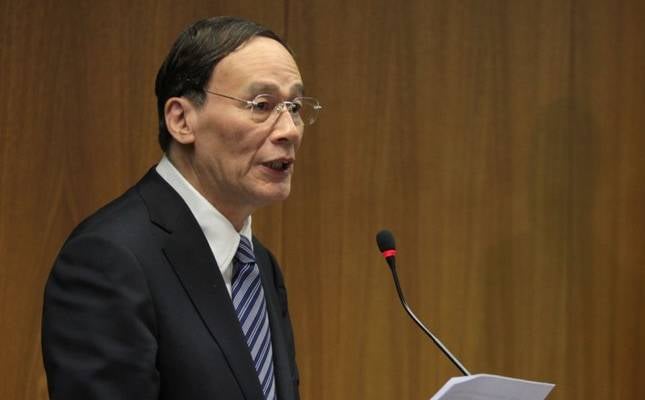China’s Wang Qishan kicked off a four-day visit to Israel to promote investment, innovation, and hi-tech collaboration between his nation and the Jewish state.
By: United with Israel Staff
Chinese Vice President Wang Qishan arrived in Israel on a four-day state visit to consolidate ties between the two countries and promote investment and trade.
Wang, who was invited by Prime Minister Benjamin Netanyahu, is one of the most senior Chinese officials to visit the Jewish state since the Chinese president visited in 2000.
Netanyahu and Wang will host the 4th meeting of the China-Israel Joint Committee on Innovation Cooperation (JCIC), which will take place at the Ministry of Foreign Affairs on Wednesday.
Vice President Wang will be the guest of honor at the prime minister’s Innovation Summit and at the ceremony inaugurating the Peres Center for Peace and Innovation.
Wang is slated to hold a working meeting with Netanyahu and to meet with Israel’s President Reuven Rivlin.
The JCIC convenes annually, alternating between Beijing and Jerusalem. This year, the Chinese delegation to the meeting will include high-ranking officials such as ministers and deputy ministers from 13 Chinese government ministries.
At the meeting, some 10 cooperation agreements will be signed, along with finalization of the action plan for the next three years.
This government-to-government (G2G) platform was set up and signed by Netanyahu with Chinese Vice Premier Liu Yandong when she visited Israel in 2014.
Advancing Inter-Governmental Cooperation
The JCIC’s work is coordinated by the Israeli Foreign Ministry and the Chinese Ministry of Science and Technology.
The JCIC advances cooperation between both countries’ governmental authorities, private sectors, and educational institutions.
“The convention and the meeting of the leaders is an opportunity for both sides to advance their agendas and sign important agreements,” Israel’s Foreign Ministry stated.
In 2016, the convention served as the launch pad for free trade talks and the initiation of a 10-year multiple entry visa agreement for tourists and businesspeople. Last year, the countries signed an agreement permitting Chinese construction workers to work in Israel, as well as the Dairy Products Protocol, paving the way for Israeli dairy product exports to the Chinese market.
Mutual trade, which stood at $50 million when relations were established in 1992, has now reached more than $11 billion. China is Israel’s third-largest trade partner in the world and its largest partner in Asia; more than a third of hi-tech investments in Israel during the past year came from China.
